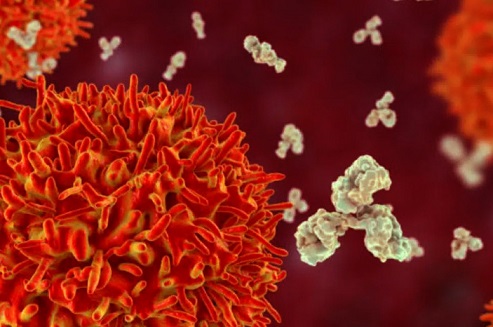Nikhil Prasad Fact checked by:Thailand Medical News Team Nov 24, 2024 10 months, 2 weeks, 5 days, 20 hours, 17 minutes ago
Medical News: A recent study from Wenzhou Medical University, China, sheds light on the long-term immune changes in COVID-19 survivors, particularly those who were critically ill. Researchers investigated immune cell patterns 50 days after symptom onset to understand the lingering impact of SARS-CoV-2.
 Lingering CD19+ B Cell Depletion Effects of COVID-19
Lingering CD19+ B Cell Depletion Effects of COVID-19
This
Medical News report focuses on the persistence of CD19+ B cell lymphopenia - a significant decrease in a subset of white blood cells - among severely affected patients. The study findings could help explain why some individuals experience prolonged symptoms, commonly referred to as Long COVID.
Key Findings: Immune Profiles Change with Severity
The research team analyzed 76 unvaccinated COVID-19 patients from three severity groups: mild, severe, and critical. They also included 92 healthy unvaccinated controls for comparison. Blood samples collected upon admission and 50 days post-symptom onset (DPSO50) revealed striking differences in immune cell counts and dynamics:
-Mild Cases:
Lymphocyte and CD19+ B cell counts remained stable.
No significant differences compared to healthy controls.
-Severe and Critical Cases:
Severe cases showed partial recovery in lymphocyte counts, while critical cases had a 45% lower CD19+ B cell count compared to mild cases.
Critically ill patients experienced a prolonged decrease in CD19+ B cells, with recovery patterns suggesting long-lasting immune system disruption.
The study identified correlations between natural killer (NK) cells and other immune subsets, highlighting the immune system's complex interplay during recovery. For example, in severe cases, regulatory T cells (Tregs) positively correlated with CD19+ B cells, suggesting a potential compensatory mechanism.
Exploring the Mechanism: B Cells and Long COVID
The study's data suggest that the immune response during and after severe COVID-19 illness is dynamic but leaves lasting scars. CD19+ B cells, essential for antibody production and immune regulation, were notably depleted in critically ill patients. While lymphopenia resolved over time, the proportional recovery of B cells lagged, possibly contributing to ongoing symptoms.
This study emphasizes that these changes could influence susceptibility to other infections or the risk of autoimmunity. Persistent CD19+ B cell depletion may weaken the body's adaptive immune response, leaving patients vulnerable during the recovery phase.
Implications for Future Research
The study raises important questions about the broader implications of immune dysregulation in Long COVID. Could these immune alterations explain chronic fatigue, brain fog, or other lingering symptoms? And how might these findings guide treatment strategies, including immunomodulatory therapies?
The researchers also noted increased NK cell counts during recovery in critical cases. This elevation, while potentially beneficial in clearing residual viral components, could also signify a hyperactive immune response. Understanding these dynamics is crucial for managing long-term outcomes in COVID-19 survivors.
Conclusion: A Step Towards Understanding Long COVID
This research provides valuable insights into the long-term immune changes in COVID-19 survivors, particularly those with severe and critical illnesses. The findings underline the importance of monitoring immune cell dynamics to identify individuals at risk of Long COVID. Prolonged CD19+ B cell depletion emerges as a potential marker for lingering symptoms and impaired recovery.
The study concludes that targeted therapies addressing immune dysregulation could improve recovery outcomes. Moreover, these findings reinforce the need for continued vigilance in managing the aftermath of severe COVID-19, even as global vaccination campaigns mitigate acute cases.
The study findings were published in the peer-reviewed journal: Frontiers in Cellular and Infection Microbiology.
https://www.frontiersin.org/journals/cellular-and-infection-microbiology/articles/10.3389/fcimb.2024.1488607/full
For the latest COVID-19 News, keep on logging to Thailand
Medical News.
Read Also:
https://www.thailandmedical.news/news/interferon-gamma-by-activated-cd4-t-cells-shown-to-inhibit-covid-19-variants-differently
https://www.thailandmedical.news/news/the-covid-19-virus-exploits-host-cd55-cd59-and-factor-h-to-evade-antibody-dependent-complement-mediated-lysis
